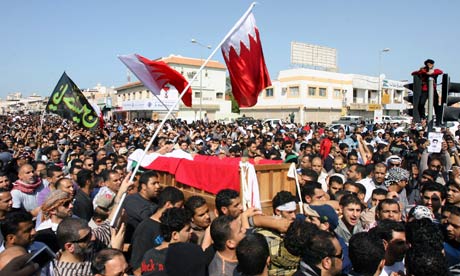Bahrain police open fire on funeral procession leaving one dead
![]()
King pledges inquiry into ‘regrettable’ deaths as thousands of protesters set up camp in capital Ian Black, Middle East editor
-

-
Shiite protesters in Bahrain carry the coffin of a comrade who died a day earlier from his wounds following clashes with police. Photograph: Adam Jan/AFP Bahrain has moved to defuse unrest by promising to investigate the killings of opposition protesters who had been inspired by the uprisings in Egypt and Tunisia.
The latest violence in the Gulf state saw the shooting of a young man at the heavily attended funeral of another who was killed by security forces on Monday.
More than 10,000 people were taking part in the funeral procession for Ali Abdulhadi Mushaima when police opened fire without warning as they chanted slogans calling for a new constitution, a democratically elected government and an end to anti-Shia discrimination in the Sunni-ruled island kingdom.
“The scene is just unbelievable,” a witness told the Guardian. “There are thousands upon thousands on the road … there were definitely chants against the regime. The crowd was getting angrier and angrier. A lot of signs said they are peaceful, and this is what we get in return.”
The latest victim was named as Fadhel Matrook by an activist, Nabeel Rajab, of the Bahrain Centre for Human Rights. Matrook was allegedly shot by security forces using pellet guns at short range.In Iran, meanwhile, hardline MPs demanded that two senior opposition leaders be executed after rare anti-government demonstrations on Monday left one person dead and dozens injured.
In the Yemeni capital Sana’a protests resumed for a fifth day, with thousands calling for the removal of veteran President Ali Abdullah Saleh and alarm over reports of increasing violence by security forces.
The continuing unrest across the Middle East prompted a call from Barack Obama for Arab governments to respond peacefully to protests. The US president advised that “to stay ahead of change, you have to be out in front”. But Russia’s foreign minister, Sergey Lavrov, urged the US to temper its pro-democracy tone.
Bahrain’s drama saw a personal intervention by King Hamad, who went on state TV – with a message for the birthday of the prophet Muhammad – to express his condolences to the families of the two victims and to promise to verify the circumstances of their “regrettable” deaths.
The political crisis deepened when Bahrain’s main Shia party, al-Wifaq, announced that it was withdrawing from parliament, where it has 18 of the 40 seats. “We decided to suspend our membership until further notice, after the aggressive attacks by the police on civilians demonstrating and carrying the kingdom’s flag and calling for political and constitutional reforms,” said leader Abdul-Jalil Khalil.
Thousands of protesters descended on Pearl Roundabout in the capital Manama and set up tents in echoes of Cairo’s Tahrir Square, pledging to stay until their demands are met. Protests began with a Day of Rage on Monday, and mass rallies are now expected after prayers on Friday. Bahrainis complained at the slowness of internet connections, fuelling speculation that the government had forced service providers to throttle speeds to slow the dissemination of information.
In Tehran, meanwhile, the authorities confirmed that a second person had died in Monday’s unrest, in which security forces used teargas, pepper spray and batons against the protesters.
The Irna state-run news agency also quoted MPs calling opposition leaders Mehdi Karroubi and Mirhossein Mousavi “corrupt on earth” – a charge which carries the death penalty in the Islamic republic.
Speaking in Washington, Obama defended his approach to the crisis in Egypt, when asked if the US had been too cautious in its approach to protests that toppled Hosni Mubarak.
“I think history will end up recording that, on every juncture in Egypt, that we were on the right side of history,” he said. “What we can’t do is pretend that we could dictate the outcome, because we can’t.”
Obama said the US message was consistent throughout. “Particularly if you look at my statements, I started talking about reform two weeks before Mr Mubarak stepped down.” In general, he added: “I think we calibrated it just right … there was relatively little anti-American sentiment, relatively little anti-Israeli sentiment, or even anti-western sentiment.”
In Jordan the government sought to head off trouble by easing restrictions on public gatherings. Tunisia, whose “Jasmine revolution” triggered the current wave of Arab unrest, extended a state of emergency in place since Zine al Abidine Ben Ali fled to Saudi Arabia, but ended a curfew imposed during the protests.
Related Articles
Malalai Joya: “Zapatero debería retirar las tropas de Afganistán”
![]()
Malalai Joya en Madrid el pasado jueves Cuando en 1880 el Imperio británico quiso conquistar el dominio del territorio afgano,
El bloque de izquierdas propuesto por IU suma a varias asambleas del 15-M
![]()
Asamblea popular del 15-M del barrio de La Elipa, Madrid.– FACEBOOK A.P. LA ELIPA Las asambleas populares de la
Bloggers en dos bandos. Definiciones
![]()
Enrique Ubieta Gómez La isla desconocida Las terceras posiciones ejercen una fascinación intelectual irresistible. Una antinomia puede ser maniquea, o



